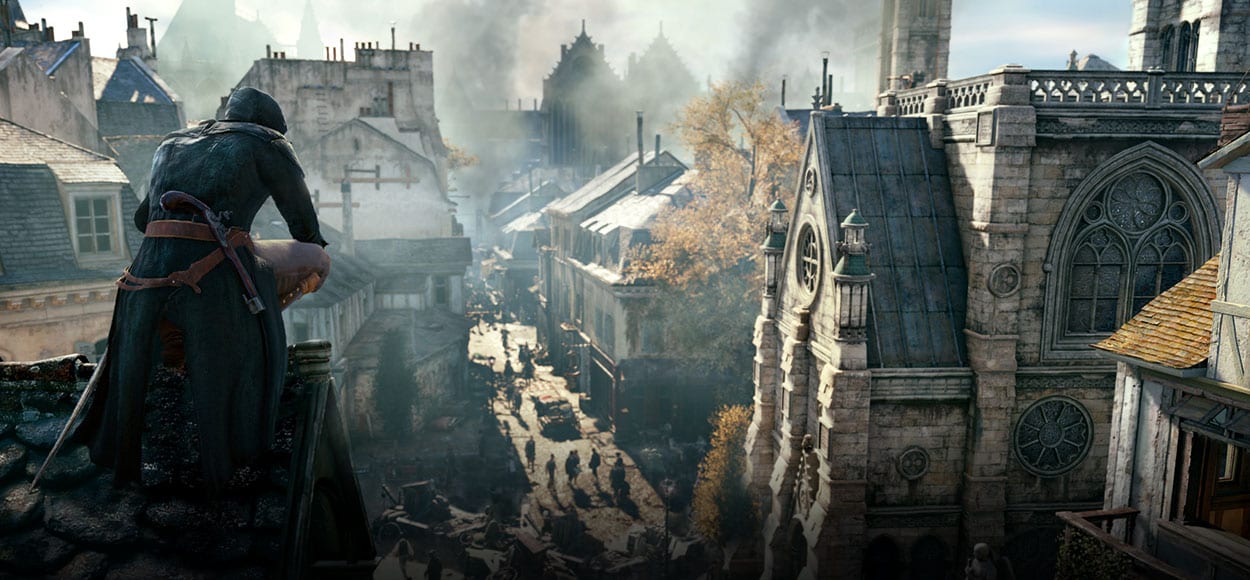Video Game Review: Assassin’s Creed: Unity

Unity’s visuals are detailed and beautiful, at least when you don’t move.
The early buzz for Assassin’s Creed: Unity was bad; from game-breaking glitches to horrifying graphical bugs, these issues soon became widespread memes around the game community. And while Ubisoft is slowly fixing them patch by patch, the actual game is getting overlooked. The truth is that Unity isn’t nearly as bad as you may have heard — but it’s far from the true next-gen innovation the series needs.
CONTROLS (4/5)
Let’s face it: as innovative as the series’ controls have been, the actual execution has always been a bit clunky. Movement tends to improve incrementally, though there’s no real evolution here. However, the contextual controls have taken a step forward. All of these are good ideas, though execution certainly varies.
Combat is no longer based purely on timing counter hits. Instead Arno uses three buttons to attack, parry and dodge. This is somewhat similar to before, at least in terms of timing. The difference is that now parries must be manually followed by an attack or dodge roll. Stealth kills and range weapons are essentially the same, but this makes combat less of a single button press.
Free running is a hallmark of the franchise and Ubisoft has finally added a practical split between up and down movement. Now when you hold the Run Down button, Arno will logically scale or jump down instead of just leaping to his death. Another sensible addition is the use of a crouch walk and stick to cover.
The cover mechanic is problematic though; not only is its detection messy, there’s no way to round corners in cover, so you have to detach, move, then re-enter cover. That process often leads to Arno getting detected. A new feature that displays a ghost image of where the guards last saw you helps smooth over some of the rougher stealth patches. Thankfully, few missions are restricted to zero detection, so you can use this as much or as little as you’d like.
GRAPHICS/SOUND (4.25/5)
Previous Ubisoft games, including this generation’s Watch Dogs, suffered from the amount of computing power spent on the actual open world. This often left in-game character models to look like melted action figures. Not so with Unity; finally, the quality of individual characters matches the beauty of the environment — which itself has seen an overhaul. The detail in Paris is exquisite, and when combined with the superb lighting engine, the entire game is a site to behold. At least when it’s still.
While the game is littered with bugs, game-breaking ones such as protagonist Arno Dorian moonwalking in mid-air or falling through roofs are prioritized, things like frame rate are lower down the list. That’s an issue because the frame rate clips in and out in almost all situations — during basic movement, during action, during cut scenes. Synchronization points, which are usually a visual highlight of the series, feature choppy camera movement that acts as quite the mood killer.
In general, Ubisoft games feature solid, if not spectacular voice acting. Unity is no different, and while not as memorable or likable as previous assassins Ezio or Edward, Arno is definitely a cut above the lifeless Altair and the jerky Connor. One strange issue is that just about all the French characters have British accents. We suppose the in-game universe chalks this up to the Animus (that’s how they explained it in the first game), but all of Ezio’s games had characters with Italian accents. Go figure.
GAMEPLAY (4.25/5)
The first Assassin’s Creed game felt a bit like an empty tech demo, but each successive iteration usually added some significant gameplay element to round out the overall experience. Perhaps that’s the biggest issue with Unity. It’s Assassin’s Creed to the core, and rather than any substantial gameplay changes, it provides a single-city focus with a plethora of content and more customization issues.
Thus, it’s more — a lot more — of the same with much prettier graphics. That’s not necessarily a bad thing, but considering how long the development team had to work on this game (insert your “not long enough” jokes here), you’d think there’d be more innovation involved.
However, exploring a historic city, parkouring around and over buildings, and stealthily killing evil doers is still fun. Outside of the technical glitches — many of which have been patched as of this writing — the gameplay itself is a solid package.
Let’s get the obvious out of the way: as with the Ezio games of the series, you’re in a massive single city exploring through, above, and below it on the neverending Assassins vs. Templars war. You won’t be running through the countryside between cities like Connor, and you won’t be pirating the high seas like Edward; this is a city-based adventure, for better or worse.
Because of that, much of the action will feel familiar. Along those lines, you’ve seen many of these missions before, though thankfully the number of “stay within range and eavesdrop” missions have been decreased. The real differences come in the details.
For the first time, the series introduces RPG-style progression and customization. Many of the moves you took for granted before now have to be earned through XP progression (called Creed Points). Arno’s equipment can also be customized in a way that is new, so while you’re playing a character, he feels more like your assassin than ever before.
Creed Points are earned through the main story missions and co-op missions. Essentially, Ubisoft is bribing you to play co-op, though the game could be finished pretty much without ever touching it. However, even for those that shy away from multiplayer, co-op is an enjoyable detour, assuming you’re playing with a sensible partner(s).
One major caveat — there is no microphone-less way of communication, which is odd considering that a wheel or menu of stock dialogue is a standard for multiplayer. Since this is stealth-based rather than shooting or Capture the Flag, it proves to be a bit of an issue.
Missions range from two-person assassinations to larger heists, and these add a different dynamic to finishing quests. In fact, if Ubisoft wanted to look at innovation, perhaps it could have used these co-op missions as a starting point to Grand Theft Auto V-style multi-protagonist play.
Outside of the main story and co-op, Unity throws at you hours and hours of content. The Paris missions are standalone side quests that touch on the city’s history. The familiar “find cryptic stuff in Eagle Vision” bit returns, this time in the form of riddles. Murder Mysteries bring Sherlock-style sleuthing to the franchise, and the Homestead-building from Assassin’s Creed 3 is cut-and-pasted into the French Revolution. In short, you won’t run out of stuff to do, but there’s a real sense that we’ve seen this all before.
OVERALL (4/5)
Technical issues aside, Assassin’s Creed: Unity suffers under the weight of its own franchise. While the game itself is solid with enjoyable co-op, there’s very little innovation here, and you have to wonder what might have been had Ubisoft focused less on getting annual releases to market and more on innovation. This mash-up of AC’s Greatest Hits In France is worthwhile for franchise fans, but even those folks will probably agree that things are getting stale.







